Peace and Nonviolence
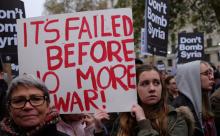
THE PEACE MOVEMENT needs a stronger response to the threat posed by the Islamic State in Iraq and Syria. It is not enough merely to oppose deepening U.S. military involvement. We must also identify viable diplomatic and political options for countering the ISIS danger and reducing violence in the region.
President Obama has said there is no military solution to the crisis in Iraq, but his administration has relied heavily on bombing as its main response to ISIS. Since August, the United States and about a dozen other states have launched more than 1,900 air strikes against ISIS and militant groups in Iraq and Syria. Approximately 80 percent of the strikes have been conducted by U.S. forces, mostly jet fighters but also armed drones. The strikes have had the effect of halting further ISIS encroachments into Iraq and have enabled Kurdish fighters to regain some ground in the northern part of Iraq. In Syria, however, ISIS reportedly has continued to gain ground despite the U.S.-led attacks.
U.S. military involvement in Iraq and Syria is having unintended effects that could make matters worse. Battling the United States gives ISIS a transcendent objective beyond its political agenda in Iraq and Syria and distracts local attention from its brutal policies. It allows ISIS to portray itself as the victim and to claim that it is defending Islam from Western attack. After the start of airstrikes in August, support for the group increased. The strikes in Syria have also targeted the al Nusra Front and have generated pressure for rival groups to close ranks. Unlike al Qaeda, ISIS has not declared war on the United States, but it may now rethink its strategic focus and plan attacks on the “far enemy,” to use al Qaeda’s term.
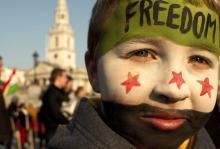
IN JULY 2013 in Raqqa, the first city liberated from regime control in northeastern Syria, a Muslim schoolteacher named Soaad Nofal marched daily to ISIS headquarters. She carried a cardboard sign with messages challenging the behaviors of members of the Islamic State of Iraq and Syria as un-Islamic after the kidnapping of nonviolent activists. After Nofal was joined by hundreds of other protesters, a small number of activists were released. It is a small achievement, but an indication of what communities supported in responsible ways from the outside could achieve on a larger scale in areas controlled or threatened by ISIS.
In the fight against ISIS, unarmed civilians would seem to be powerless. How can collective nonviolent action stand a chance against a heavily armed, well-financed, and highly organized extremist group that engages in public beheadings, kidnappings, and forced recruitment of child soldiers and sex slaves? One whose ideology sanctions the killing of “infidels” and the creation of a caliphate?

THE MERCILESS BRUTALITY of ISIS jihadists—from the beheading of 21 Egyptians to the burning alive of a Jordanian soldier—is a moral outrage and a deepening concern for the world’s political powers. While debate rages about military answers, another under-the-radar response has emerged inside of ISIS-held territories: Nonviolent resistance.
A couple of folks I really respect – Kate Gould of Friends Committee on National Legislation (aka, the Quaker Lobby), and Jim Wallis of Sojourners – were recently on the O’Reilly Factor. For those of you who don’t watch cable news, this is a television program where Bill O’Reilly basically screams at people and incites hatred of anything non-white, non-rich, and non-Republican. I normally don’t watch the show. But when I heard that Kate and Jim were going to be talking, I tuned in.
I knew almost immediately this wasn’t going to be good. It’s Bill’s program, so he gets to frame the question. Here’s what he asks: Do Christian pacifists have a solution for stopping ISIS?
It’s the wrong question.

Only 15 women have been executed in the U.S. since the reinstatement of the death penalty in 1976. For two death penalty cases involving women to make the news in the same week is unprecedented – but it’s happening.
One is Jodi Arias, convicted of killing her ex-boyfriend in 2008, whose sentencing trial was this week. She could face the death penalty in Arizona.
The other is a lesser-known case in Georgia — Kelly Gissendaner, convicted in a 1997 Atlanta murder plot that targeted her husband. Though sentenced to death, it is clear that with a little better legal coaching, Ms. Gissendaner could have plea-bargained for her life. That’s exactly what her husband’s killer, Gregory Owens, did. And now he’s behind bars as she counts down the hours to her death. It just doesn’t feel like your life should depend on how well you play the legal cards, but it sure seems to.
Kelly Gissendaner was supposed to die Wednesday night — but there was an interruption.
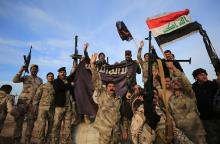
As an evangelical theologian and pastor, I want to say that ISIS is evil. Evil is a term we don’t normally hear in the media or politics, which is likely a good thing given our lack of public morality and civility these days. Indeed, judgementalism was condemned by Jesus, but is still often practiced by many churches — so humility is always called for. But it is still a responsibility of the faith community to name evil where it clearly exists in the world. And by any standards, the actions of ISIS are evil.
The latest report issued by the Office of the UN High Commissioner for Human Rights and the UN Assistance Mission for Iraq on “The Protection of Civilians in Armed Conflict in Iraq,” catalogues the human rights atrocities committed by ISIS, making it abundantly clear that this group is evil. They include:
- attacks directly targeting civilians and civilian infrastructure,
- executions and other targeted killings of civilians,
- abductions, rape and other forms of sexual and gender based violence perpetrated against women and children,
- slavery and trafficking of women and children,
- forced recruitment of children,
- destruction or desecration of places of religious or cultural significance,
- wanton destruction and looting of property, and denial of fundamental freedoms.
The report goes on to identify the targeting of ethnic and religious groups — such as Christians, Yazidis, Shi’ite Muslims, and many others —and subjecting them to “gross human rights abuses, in what appears as a deliberate policy aimed at destroying, suppressing or expelling these communities permanently from areas under their control.” The report describes the actions as possible “war crimes, crimes against humanity, and possibly genocide.”
In light of these sober findings, the faith community must remind the world that evil can be overcome, and that individuals involved in evil systems and practices can be redeemed. But how to overcome evil is a very complicated theological question, which requires much self-reflection. In trying to figure out how to overcome evil, it is often helpful to first decide how not to. Here is a good example of how not to respond to the reality of evil.

Bugsplat is software used to calculate and reduce the death of innocent people in drone strikes. It's also how Predator drone operators talk about the people whom the American military kills in these missions. The Bureau of Investigative Journalism estimates that the U.S. is responsible for 2,500 deaths in Pakistan, Yemen, Somalia since 2001, including dozens of children. This figure doesn¹t even count Iraq and Afghanistan. But we don't know for sure how many innocents die because most Americans, including too many of our political and military leaders, do not even know when drone strikes happen, whom exactly they target and why, and whether they are successful in achieving their objectives.
Drone attacks require the president's review and approval. And it is the military's responsibility to execute plans so that no innocent lives are lost. But our democracy is a work in progress, and it will only function well if American citizens stay involved. Given President Obama's request last fall for Congress to approve strikes in Syria, we should call on elected officials to fully debate the 2001 Authorization for Use of Military Force — which has often served as a blanket legal justification for drone strikes, going far beyond its original purpose to take action against those responsible for the September 11 attacks. Repealing the act will help reinstate the checks and balances that are hallmarks of democracy. Our leaders must be more transparent.

With the unimaginable evils being committed by ISIS and other terror groups around the world, many Christians are calling for their violent destruction — some even voluntarily taking up arms.
At first glance this may seem like a heroic, brave, and honorable act, but before we start killing our enemies, Christians must ask themselves four very important questions:
1. Did Jesus clearly tell you to kill these people?
In the New Testament, Jesus repeatedly instructs his followers to avoid violence and promote peace.
Jesus states things like:
Blessed are the peacemakers, for they shall be called sons of God. (Matt. 5:9 ESV)
And …
You have heard that it was said, ‘An eye for an eye and a tooth for a tooth.’ But I say to you, Do not resist the one who is evil. But if anyone slaps you on the right cheek, turn to him the other also. (Matt. 5:38-39)
And …
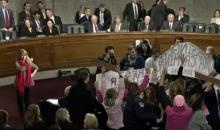
After a week here in FMC Lexington Satellite camp, a federal prison in Kentucky, I started catching up on national and international news via back issues of USA Today available in the prison library. An "In Brief" item, on p. 2A of the Jan. 30 weekend edition, caught my eye. It briefly described a protest in Washington, D.C., in which members of the antiwar group "Code Pink" interrupted a U.S. Senate Armed Services budget hearing chaired by Sen. John McCain (R-Ariz.). The protesters approached a witness table where Henry Kissinger, Madeleine Albright, and George Schulz were seated. One of their signs called Henry Kissinger a war criminal. "McCain," the article continued, "blurted out, 'Get out of here, you low-life scum.'"
At mail call, a week ago, I received Richard Clarke's novel, The Sting of the Drone, about characters involved in developing and launching drone attacks. I'm in prison for protesting drone warfare, so a kind friend ordered it for me. The author, a former "National Coordinator for Security and Counterterrorism," worked for 30 years inside the U.S. government but seems to have greater respect than some within government for concerned people outside of it. He seems also to feel some respect for people outside our borders.
He develops, I think, a fair-minded approach toward evaluating drone warfare given his acceptance that wars and assassinations are sometimes necessary. (I don't share that premise). Several characters in the novel, including members of a House Permanent Select Committee on Intelligence, criticize drone warfare, noting that in spite of high level, expensive reconnaissance, drone attacks still kill civilians, alienating people the U.S. ostensibly wants to turn away from terrorism.

The violence of our world seems to be spiraling out of control. Every news outlet is filled with the latest tragedy and for many, the violence has struck closer to home than they ever imagined. Sadly, much of the violence is being done in the name of religion. Religion — at its best — is designed to be a conduit for right relationship. At it’s worst, used as a tool for manipulation and violence. While the former is certainly happening, the latter appears to be one step ahead at the moment.
If ever there were a time where the work of peacemaking seemed soft and unrealistic while proposing some kind of fairy tale future reality, it is now. If ever there were a time to set aside the way of reconciliation for the way of revenge, it is now. Peacemaking appears to be a royal waste of time reserved for the ignorant idealists.
Yet, if ever there were a time the exact opposite case could be made, it is now. In recent history, there has never been a time peacemaking is more necessary. In fact, the moment we deny the necessity for peacemaking, we deny the very mission of God and the vocation of God’s people. God’s work is peace — the holistic repair of relationship — and the vocation of God’s people. We aren’t pawns in a divine drama that will end in an atomic holocaust allowing us to apathetically put our hands up in resignation because “everything is going to hell.” No, the Jesus Community is to announce the reality of God’s kingdom and participate in God’s activity of making all things new. And not just in some future world, but NOW.
Where do we start and how do we keep hope in a world of war?
We need to give up peace for Lent.

For the Obama administration and the Bush administration before it, drone strikes kill terrorists before terrorists can kill innocents, and the strikes keep American soldiers out of harm’s way.
But for a group of faith leaders, drones are a crude tool of death that make killing as easy as shooting a video game villain, and they put innocents in harm’s way.
These religious critics — 150 ministers, priests, imams, rabbis, and other faith leaders who gathered at the Interfaith Conference on Drone Warfare at Princeton Theological Seminary in late January — have spent the weeks since drafting a statement that calls on the U.S. to halt targeted lethal drone strikes.
“There are enough problems with the current drone policy and the use of drones that we need a break,” said the Rev. Richard Killmer, director of the conference. “Drones have become a weapon of first resort and not last resort. It has made it a lot easier to go to war.”

On Tuesday, the U.S. government confirmed that 26-year-old Kayla Mueller, a captive of ISIS since August 2013, has died.
While circumstances of her death remain unclear, details of the young woman's life and work — most recently helping refugees in Aleppo, Syria — have emerged in the last 24 hours, as family, friends, and members of her community share memories and anecdotes of her compassion and big heart for those in need.
The Washington Post reports:
The Rev. Kathleen Day, who headed a campus ministry that Mueller joined at Northern Arizona University, recalled that she wrote in a letter from captivity that she tried to teach crafts to her guards, including how to make origami peace cranes.
“We just delight in that,” Day said, “that Kayla remained Kayla. She said she found freedom even in captivity.”
The Post also shared a letter written by Mueller to her family while in captivity. In it Mueller expresses her experience of faith:
"I remember mom always telling me that all in all in the end the only one you really have is God. ...I have been shown in darkness,light + have learned that even in prison, one can be free."
Mueller's family on Tuesday referenced another letter in which Mueller had written of her faith, this time to her father in 2011. According to the family, Mueller wrote:
"I find God in the suffering eyes reflected in mine. ...I will always seek God. Some people find God in church. Some people find God in nature. Some people find God in love; I find God in suffering. I've known for some time what my life's work is, using my hands as tools to relieve suffering."
In their statement, Mueller's family said,
"We remain heartbroken, also, for the families of the other captives who did not make it home safely and who remain in our thoughts and prayers. We pray for a peaceful resolution of the conflict in Syria."
The family has reportedly requested that expressions of sympathy be made to causes that Kayla would have supported. KPHO reports that additional information will be made available in the coming week.

The conservative Twitterverse is all riled up because at Feb. 5 National Prayer Breakfast (an event founded and run by the secretive Christian organization known as The Fellowship), President Obama said that Christians, as well as Muslims, have at times committed atrocities. His words:
“Humanity has been grappling with these questions throughout human history. And lest we get on our high horse and think this is unique to some other place, remember that during the Crusades and the Inquisition, people committed terrible deeds in the name of Christ. In our home country, slavery and Jim Crow all too often was justified in the name of Christ.”
This would seem to be Religious History 101, but it was nonetheless met with shock and awe.
“Hey, American Christians–Obama just threw you under the bus in order to defend Islam,” wrote shock jock Michael Graham. Rep. Marlin Stutzman, R-Ind., called the comments “dangerously irresponsible.” The Catholic League’s Bill Donohue said: “Obama’s ignorance is astounding and his comparison is pernicious. The Crusades were a defensive Christian reaction against Muslim madmen of the Middle Ages.”
More thoughtfully, Russell Moore, president of the Southern Baptist Ethics and Religious Liberty Commission, called Obama’s comments about Christianity “an unfortunate attempt at a wrongheaded moral comparison. … The evil actions that he mentioned were clearly outside the moral parameters of Christianity itself and were met with overwhelming moral opposition from Christians.”
Really?
After the high-profile domestic violence cases of Ray Rice and Adrian Peterson, the NFL is speaking out with a new Super Bowl Ad. The commercial features a woman pretending to order a pizza in a call to a 911 operator as the camera rolls over shots of a disheveled home. The operator eventually comes to understand that the woman is trying to ask for help without alerting her abuser.
The NFL created the ad in partnership with No More, an umbrella organization that connects groups working to end domestic violence and sexual assault.

What good would it do for three kayaks, three canoes, and a rubber dinghy to paddle into the path of a Pakistani steamship? For a tiny fishing boat with unarmed, praying Americans aboard to sail toward an American battleship threatening Nicaragua? For an 80-year-old lady in a wheelchair to stop in front of advancing Filipino tanks? Or for nonviolent protesters to defy the communist rulers of the Soviet Empire?
Soviet communism collapsed. The tanks stopped and a nonviolent revolution succeeded. The American battleship left and the threat of invasion faded. And the U.S. shipment of arms to Pakistan stopped.
Those are just a few of the many dramatic successes of nonviolent confrontation in the last several decades. Everyone, of course, knows how Mahatma Gandhi’s nonviolent revolution eventually defeated the British Empire and – as the powerful film Selma now reminds us – Martin Luther King Jr.’s peaceful civil rights crusade changed American history. There have been scores upon scores of instances of nonviolent victories over dictatorship and oppression in the last 50-plus years. In fact, Dr. Gene Sharp, the foremost scholar of nonviolence today, has said that the later 20th century saw a remarkable expansion of the substitution of nonviolent struggle for violence. More recent scholarship has not only confirmed Sharp’s comment; it has also shown that nonviolent revolutions against injustice and dictatorship are actually more successful than violent campaigns.

In 2010, the book, The Boy Who Came Back From Heaven, was released. At the time, I believe I gave this news about 0.3 percent of my attention, and 0.1 percent was spent lamenting terrible theology prevalent in the popular Christian book market.
I don’t believe we die and are snatched up to heaven, but that is subject for another post — or better yet, go read N.T. Wright’s Surprised by Hope. Another 0.1 percent of my energies went toward flinching and cringing at the way this boy was IMO being exploited for book sales. In hindsight, I should have spent more time praying for him and his mother, whose cries for truth has been silenced by the powerful machine of the publishing industry. The last 0.1 percent was energy exerted to shaking my head at the allure of sensationalism — enough to shift millions of books and a movie deal.
It came as no surprise when last week The Boy Who Came Back From Heaven retracted his story.

The Bureau of Prisons contacted me today, assigning me a prison number and a new address: for the next 90 days, beginning tomorrow, I’ll live at FMC Lexington, in the satellite prison camp for women, adjacent to Lexington’s federal medical center for men. Very early tomorrow morning, Buddy Bell, Cassandra Dixon, and Paco and Silver, two house guests whom we first met in protests on South Korea’s Jeju Island, will travel with me to Kentucky and deliver me to the satellite women’s prison outside the Federal Medical Center for men.
In December 2014, Judge Matt Whitworth sentenced me to three months in federal prison after Georgia Walker and I had attempted to deliver a loaf of bread and a letter to the commander of Whiteman Air Force base, asking him to stop his troops from piloting lethal drone flights over Afghanistan from within the base. Judge Whitworth allowed me more than a month to surrender myself to prison; but whether you are a soldier or a civilian, a target or an unlucky bystander, you can’t surrender to a drone.
When I was imprisoned at Lexington prison in 1988, after a federal magistrate in Missouri sentenced me to one year for planting corn on nuclear missile silo sites, other women prisoners playfully nicknamed me “Missiles.” One of my sisters reliably made me laugh today, texting me to ask if I thought the women this time would call me “Drones.”
It’s good to laugh and feel camaraderie before heading into prison. For someone like me, very nearly saturated in “white privilege” through much of this arrest, trial, and sentencing process, 90 percent (or more) of my experience will likely depend on attitude.

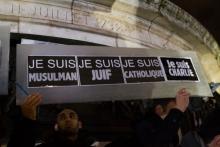
Our first response to the horrible and frightening violence of Paris should be grief. False religion always makes the religious grieve, but when it engages in ghastly violence against other human beings who are made in God’s image, it should break our hearts as it breaks God’s.
These hateful terrorists, masquerading as religious believers, said on video they were the “avengers” of the prophet Mohamed. As such, they murdered cartoonists in the office of a magazine they identified with blasphemy. What these killers, and those like them, don’t understand is that they are the real blasphemers now by forcing their false and murderous distortions of Islam on the world and on other children of God. Their religion is now violence itself, a blasphemous interpretation of Islam, which in its truest expression is a religion of peace. Rev. Wes Granberg-Michaelson, from the Reformed Church in America, has called Paris an “identity theft” of the Muslim faith. Several Muslim leaders have said that the damage terrorists like these do to the image of the Prophet Mohammed is much greater than any cartoonist could ever do.
While the tenet of freedom of speech has been invoked throughout the media coverage of the attacks, the religious implications here run much deeper. They are about how we in the faith community should respond when we are attacked by those who disdain us, disrespect us, distort us — as many believe the satirical French magazine, Charlie Hebdo regularly did — and even viciously attack us. The magazine has often crudely, provocatively, and even gleefully satirized all religions in very offensive ways, suggesting that the fundamentalisms in all our religious traditions completely define the meaning of faith. Charlie Hebdo is apparently driven by its own ideology of secular fundamentalism, which regularly strikes out at all people of faith.

The real war on terror is not a war on Western values or American values. It is evil perpetuating crimes of power and control, and its costs are measured in real in human lives. Those lives are largely black and brown, and the focus on the danger to America with its resulting protectionism and cultural-centrism is endangering lives long term.
Church, let us not join in the narrative of self-preservation. Let us not value those who look and think like our own community more than those who are culturally different. Let us not value the wealthy more than the impoverished. Let justice-speech ring from our pulpits, and let love for the culturally different be reflected in our prayers and our financial endeavors. For the world to hear that in Christ all lives matter, we the Body must speak loudly and demonstrate that #blacklivesmatter #brownlivesmatter.